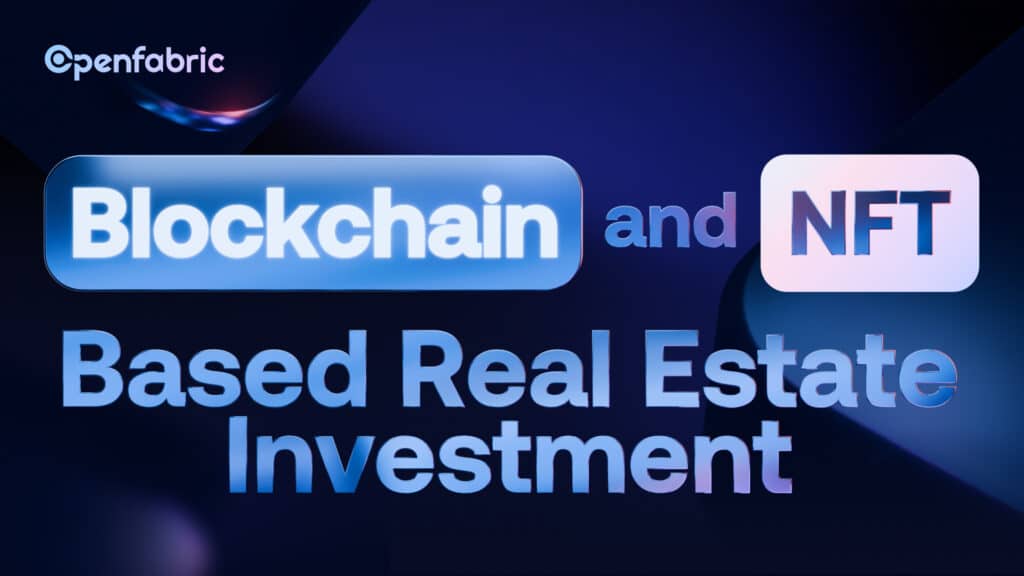
August 30, 2024 5 minutes read
Blockchain and NFT Based Real Estate Investment

The world changes in various ways that we may not be able to anticipate. Since the implementation of blockchain technology into industries, these changes have grown significantly. Similarly, a groundbreaking innovation is disrupting the traditional real estate industry nowadays. This new innovation is the creation of NFT based real estate investment opportunities for wealth creation.
NFTs are cryptographic tokens that prove ownership and authenticity of unique digital assets, such as artwork, collectibles, and now tokenized real estate properties. They enable the creation of unique digital twins of physical properties. This allows for fractional ownership of that property, secures the storage of property data, and verifiable provenance.
The potential of NFTs is what enables new innovations such as tokenized property investment, decentralized property marketplaces, and smart contracts for automated property management. As a result, the real estate industry has been seeing a huge shift, with blockchain and NFTs unlocking new levels of liquidity, transparency, and innovation. Imagine securing investments and finalizing deals in just minutes, all from the convenience of your smartphone. That is just the beginning of NFT based real estate investment.
In this article, we will explore in detail the transformative impact of NFTs real estate. We will also see the possibilities and limitations of this revolutionary development.
Let’s get started!
Benefits of NFT Based Real Estate Investment
The integration of NFTs in real estate unlocks a lot of benefits. These benefits transform the way we buy, sell, and own properties.
Here are the benefits of using NFTs to invest in real estate.
Joint possession
NFTs allow for multiple investors to co-own a property, increasing liquidity and diversification. This means that fractions of investors can own a property. Digital tokens can be used to divide properties creating a share-price structure, allowing for partial ownership and increased accessibility. This opens up to a wide range of investors including small scale investors or those who may not have the capital to invest in entire properties.
Transparent transactions
Real estate scams are very common these days. In 2023 alone, there was a record of $145,243,348 losses in real estate scams alone. That is a big number!
However, with the aid of blockchain technology, transactions are smooth and efficient. Smart contracts are in place to streamline the entire process, manage properties,distribute revenue and strengthen security by reducing risk of fraud.
Global market reach
Thanks to NFTs, expanded market access is possible. Regional boundaries cannot stop investors from owning a property.
Enhanced liquidity
Real estate investments are generally illiquid and inefficient. This means that it takes time to benefit from the entire investment because of the long processes involved in sales and intermediaries. On the other hand, with the integration of NFTs in real estate investment, people can buy, sell, or trade them with minimal transaction times. Thereby enhancing efficiency and reducing cost.
Absolute history of ownership
Blockchain technology makes provision of the history of every transaction for every property. Previous buyers can be studied, all investments on the property can be known, actions taken, legal disputes resolved and many more.
Current Use Cases of NFT Based Real Estate Investment
Blockchain integrated platforms
- In 2021, a United States real estate platform that specializes in blockchain technology and NFTs, Propy, delivered its first property sale using blockchain technology. What is propy? A blockchain infused real estate marketplace that exploits smart contracts to facilitate financial transactions globally. With Propy users can buy, sell and own properties using cryptocurrencies and NFTs including traditional currencies. The PRO token is the native token of the proxy platform which aids in facilitating transactions.
- Another platform is the RealT platform. Which allows fractional and frictionless real estate investing. With the help of blockchain, users can buy into real estate.
Real world asset tokenization
Buildings and structures around the world are getting tokenized. Therefore, various investors worldwide can own a share of these structures without losing capital liquidity.
What are the challenges?
Despite its numerous benefits and widespread adoption, there are still challenges. Understandably, as a new technology, there are still issues that may limit the widespread adoption of NFTs in real estate. These include:
Integration With Traditional Real Estate System
Challenges can arise from the transformation of the traditional real estate market to an NFT based system. Therefore, there is a need for integration systems to facilitate investments and transactions.
Regulatory uncertainty
NFTs and tokenization in real estate are still in their early stages. With evolution still in progress, regulations on NFT based real estate investments are still not clear. Digital assets need regulatory frameworks to be widely used.
Technical Challenges
Blockchain technology can be complex. To integrate NFTs tokenization for real estate investment, it requires blockchain technology, smart contrasts development and interoperability with traditional finance. The complexity of it makes its adoption progress slow.
Market Variability
The value and worth of NFTs varies. Market trends, demands, and speculative investment can influence it. This variability can affect the stability of real estate investment.
What NFT Based Real Estate Means for the Future of Real Estate Investment
Tokenizing real estate through NFTs marks a significant change in property ownership and investment. NFTs could drastically alter the real estate industry, creating new opportunities for investors and changing how properties are bought, sold, and managed.
Additionally, NFT-based has the potential to revolutionize the future of real estate as we know it. By facilitating fractional ownership, increasing liquidity and providing decentralized access. Integrating blockchain technology provides secure and transparent transactions while smart contrasts aid processes and automate transactions.
Furthermore, this revolutionized approach in real estate gives room for global accessibility. As such, location is not a barrier. You can be anywhere and own an asset anywhere. Also gives room for new investment opportunities and innovative business models.
In addition, as the technology advances and regulations adapt, NFTs are set to have a major impact on the future of real estate ownership and investment.
Conclusion
The increase in the tokenization of real estate properties will cause a complementary increase in the liquidity of the real estate market. Thus, there are more investment properties and resultantly more wealth creation opportunities. Investors can use their liquid capital for trading and other investments opportunities available.
The Openfabric platform helps investors to easily navigate the creation and trading of NFTs on a decentralized platform. This helps to widen the opportunities for growth and wealth creation for them. Openfabric AI is committed to navigating the challenges surrounding the full implementation of NFT based property ownership. NFT based real estate investment could be a new opportunity for investors with little capital to start their wealth creation journey.
For more information, visit our WEBSITE today.

